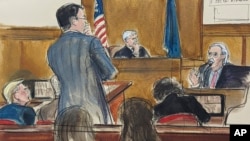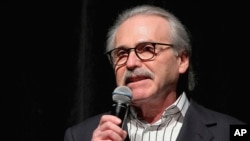Former tabloid publisher David Pecker testified at Donald Trump’s New York criminal trial Thursday that the then-future president gave him the impression that he knew a Playboy model who was trying to sell rights to her claim of a monthslong affair with Trump.
In the 2016 conversation, Trump described Karen McDougal as “a nice girl,” Pecker testified Thursday. He said that led him to believe Trump “knew who she was” even though he has denied having sex with her.
A year later, after Trump had become president, Pecker said Trump asked him "how Karen is doing" as they walked on the White House grounds. Pecker said he responded that she was doing well. "She is quiet," he recalled telling Trump.
Pecker, who has been testifying under subpoena, told prosecutor Joshua Steinglass that he harbors no ill will toward Trump.
"On the contrary," Pecker said, "I felt that Donald Trump was my mentor. He helped me throughout my career."
Pecker said he has not spoken with Trump since 2019, but that "even though we haven't spoken, I still consider him a friend."
Trump sat solemnly as Pecker described the conversation. Eventually, Pecker said that at the urging of Trump’s lawyer and political fixer, Michael Cohen, his grocery store tabloid, National Enquirer, paid McDougal, the magazine’s 1998 Playmate of the Year, $150,000 for the rights to her story.
Pecker called the payment to McDougal “a very, very large purchase,” but said he had no intention of publishing her claim of an affair with Trump, a practice now commonly known as “catch and kill.” It entails buying the exclusive rights to negative information about celebrities and then refusing to publish it.
On cross-examination, Trump defense lawyer Emil Bove sought to plant the seed with the 12-member jury that it was not unusual, and certainly not criminal, for the National Enquirer to purchase the rights to McDougal's story and then suppress it.
Pecker told Bove that the tabloid would sometimes buy negative information from sources and then use it as leverage to get celebrities to give interviews to the tabloid.
Pecker said the tabloid published only about half the stories it bought and often killed information about celebrities, including some related to actor Arnold Schwarzenegger, a Republican, as he ran for California governor; golfer Tiger Woods; and former Chicago Mayor Rahm Emanuel, a Democrat who is currently the U.S. ambassador to Japan.
Paying for derogatory information and then killing it is not a normal practice in American journalism; Bove suggested it was "standard operating procedure."
Pecker conceded to Bove that he had never heard the phrase "catch and kill" until he heard it from a prosecutor, the implication being that the purchase of McDougal's story was not specifically unusual to benefit Trump. Pecker said that for years he had given Trump a heads-up about negative stories, not just in 2016.
Pecker, 72, will be on the witness stand for a fourth day on Friday, answering more questions from Bove.
Under questioning from prosecutor Steinglass, Pecker, a friend of Trump’s for decades, told the jury that he didn’t “want this [McDougal] story to embarrass Mr. Trump or embarrass or hurt” his 2016 run for the presidency.
Alleged conspiracy
Earlier in the week, Pecker testified that he had agreed at a 2015 meeting – a discussion prosecutors are calling the “Trump Tower conspiracy” session – to help his presidential campaign by publishing favorable stories about Trump while keeping an eye out for women trying to sell stories about their encounters with Trump or other negative stories.
While there is nothing illegal about arranging hush money payments, the prosecution is arguing that Pecker's arrangement with Trump and Cohen, Trump's onetime lawyer, was part of a conspiracy to keep voters from learning embarrassing information about Trump ahead of voting in 2016.
Pecker said Cohen had told him Trump would reimburse him for the $150,000 paid to McDougal but that he never did.
Earlier in the week, Pecker said that even before the discussions about McDougal, he had already paid $30,000 to a doorman at a Trump property in New York to quash his ultimately bogus story that Trump had fathered an out-of-wedlock child.
In the first-ever criminal trial of a former U.S. president, Trump is accused of falsifying business records to hide another payment, $130,000 to porn film actress Stormy Daniels, to keep her quiet ahead of the 2016 election about her claim of a one-night tryst with Trump a decade earlier. Trump has also denied her account and all 34 charges he is facing.
Trump, the presumptive 2024 Republican presidential nominee, faces an unprecedented four indictments encompassing 88 charges, all of which he has denied. But the New York case may be the only one that goes to trial ahead of the November election, in which it is projected that Trump will face President Joe Biden, the Democrat who defeated him in 2020.
The payments to McDougal and Daniels came just ahead of the November 2016 election, and just after The Washington Post unearthed an old outtake from the celebrity show “Access Hollywood,” in which Trump boasts about grabbing women’s genitals.
Pecker called the TV revelation “very embarrassing, very damaging” to the campaign.
About the same time, Pecker said Daniels was trying to sell her story of an alleged liaison with Trump for $200,000. But the tabloid publisher testified that after already paying the doorman and McDougal, he was not interested.
“I am not a bank,” he said.
Payment by Cohen
Prosecutors say Cohen ultimately paid Daniels $130,000 of his own money and then was reimbursed by Trump through falsified business ledgers claiming the money was compensation for Cohen’s legal work. The transactions are at the heart of the criminal allegations against the country’s 45th president.
The saga over the payment to McDougal was not the final word before the election. The Wall Street Journal published an account of her hush money deal four days before the voting, infuriating Trump.
Pecker said Trump called him and was “very upset, saying how could this happen, I thought you had this under control, either you or one of your people have leaked the story.” Pecker said the call ended without Trump saying goodbye.
Still, the tabloid publisher said Trump thanked him in a Trump Tower meeting just before his January 2017 presidential inauguration for buying the stories that the doorman and McDougal were selling.
While the testimony continues, Judge Juan Merchan is still considering a demand by prosecutors that Trump be held in contempt of court for violating the judge’s gag order prohibiting him from criticizing any of the witnesses, prosecutors, jurors or court staff, which the prosecutors say Trump has done 14 times.
Under the gag order, Trump is free to criticize two key figures in the case - Merchan and the New York prosecutor who brought the case, Alvin Bragg - which Trump has frequently done.














